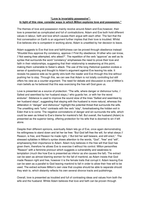“Love is invariably possessive”:
In light of this view, consider ways in which Milton explores love and possession.”
The themes of love and possession mainly revolve around Adam and Eve,however, their
love is presented as complicated and full of contradictions. Adam and Eve both hold different
values in labour, faith and love which causes them argue with each other. The fact that the
first conversation on Earth is an argument further implies that their love is troubled. Whilst
Eve believes she is competent in working alone, Adam is unsettled by her decision to leave.
Adam suggests to Eve that love and faithfulness can be proved through obedience instead:
“Wouldst thou approve thy constancy, approve // First thy obedience; th’other who can know,
// Not seeing thee attempted, who attest?”. The repetition of the verb “approve” as well as its
syntax that surrounds the word “constancy” emphasises the need to prove their love and
faith in their relationships, suggesting that their relationship is weakening at this point,
making them vulnerable to Satan’s attack. The use of the long rhetorical question evokes a
sense of questioning and thought to Adam’s argument against Eve leaving his side. It
reveals his passive side as he gently stirs both the reader and Eve through this line without
pushing her to stay. Through this, we can see that Adam is not totally controlling but still
offers his view as a counter argument. The need for debate and discussion is one of Milton’s
main beliefs as he believed that this was exercising the free will God gave us.
Love is presented as a source of protection: “The wife, where danger or dishonour lurks, //
Safest and seemliest by her husband stays,// who guards her, or with her the worst
endures”. Sibilance is used to improve the sound slow of the lines “Safest and seemliest by
her husband stays”, suggesting that staying with the husband is more natural, whereas the
alliteration in “danger” and dishonour” highlight the potential threat that surrounds the wife.
The unsettling verb “lurks” contrasts with the verb “stay”, foreshadowing the hidden evil in
Eden that is to come. The negative connotations of danger and sin surrounds the wife, which
could be seen as linked to Eve’s blame for mankind’s fall. But overall, the husband (Adam) is
presented as the superior being, offering protection for his wife that is doomed to sin if left
alone.
Despite their different opinions, eventually Adam lets go of Eve, once again demonstrating
his willingness to stand down and let her be free: “But God left free the will, for what obeys //
Reason, is free, and Reason he made right, // But bid her well beware, and still erect,”. The
stressed syllables in Milton’s syntax draws attention to the words, “God”, “free” and “will”,
emphasising their importance to Adam. Adam truly believes in the free will that God has
given them, therefore he allows Eve to exercise it without his control. Milton personifies
“Reason” with a feminine pronoun which suggests a vulnerability and weakness to
temptation (much like how Eve is presented as inferior as she causes the fall). The extract
can be seen as almost blaming women for the fall of mankind, as Adam insists that God
made Reason right and free, however it is the female traits that corrupt it. Adam leaving Eve
can be seen as a parallel to God leaving mankind to fall in order to allow their free will to be
used. The extract echoes Milton’s own view that couples should be able to separate should
they wish to, which distantly reflects his own several divorce tracts and publishings.
Overall, love is presented as troubled and full of contrasting ideas and values from both the
wife and the husband. Whilst Adam believes that love and faith can be proven through





